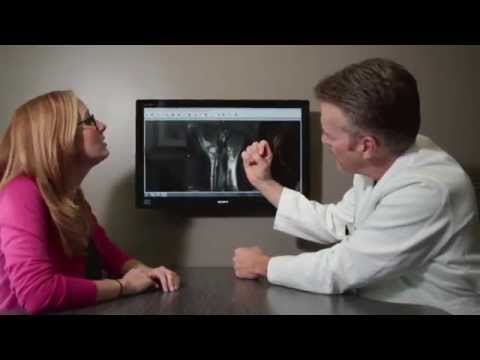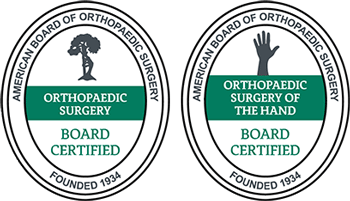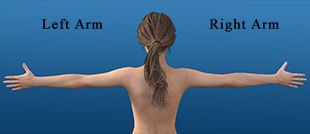What Causes a Pinched Nerve?
A pinched nerve is a common condition that can cause significant discomfort if left untreated. Recognizing the signs of a pinched nerve and knowing when to seek medical attention are important steps for managing this condition effectively. In this article, our team at The Hand and Wrist Institute in the Dallas, Texas, area will explore what a pinched nerve is and the signs and symptoms to watch out for. We’ll also explain the typical underlying causes of a pinched nerve and how to treat it to provide some much-needed relief from the pain and inflammation.
Contents
What Is a Pinched Nerve?

A pinched nerve, also known as nerve compression or nerve impingement, is a painful condition caused by a nerve being compressed or squeezed by the surrounding tissue, bones, tendons, or ligaments. This compression can prevent the nerve from functioning properly and cause pain, numbness, tingling, or weakness in the affected area. Pinched nerves can occur anywhere in the body but are most common in:
- The spine, such as in the neck, upper middle back, or lower back.
- The wrists, such as with carpal tunnel syndrome.
- The elbows.
- The knees.
A pinched nerve can affect several areas of your body, not just the area where the pinched nerve occurs. For example, a pinched nerve in your cervical spine can give you a stiff neck, and you may feel pain and numbness in your shoulder and arm. If you have a pinched nerve in your lower back, you may feel pain and discomfort in your back, buttocks, hips, and legs.
Signs and Symptoms of a Pinched Nerve
The signs and symptoms of a pinched nerve can vary depending on the location and severity of the compression. Here are some of the most common symptoms you can expect:
- A sharp, shooting, or burning pain in the affected area that may radiate outward. For example, a pinched nerve in the neck may cause pain that travels down the arm.
- Numbness, tingling, or a “pins and needles” sensation in the affected area, such as the fingers, hands, arms, legs, or feet.
- Pain that worsens with certain movements or positions, such as making repetitive movements, sitting or standing for long periods, or bending the affected area.
- Muscle weakness or difficulty moving the affected body part. It may feel as though the area has “fallen asleep.”
- Decreased sensitivity to touch or changes in sensation, such as hypersensitivity or a hot/cold sensation.
- Muscle spasms or contractions in the area surrounding the pinched nerve.
- Loss of reflexes in the affected area, detected during a physical examination by a health care provider.
It’s important to note that the symptoms of a pinched nerve can be very similar to those of other conditions, which means a thorough evaluation by a health care professional at The Hand and Wrist Institute is necessary for an accurate diagnosis. Prompt treatment can help ease symptoms and prevent complications associated with nerve compression.
What Causes a Pinched Nerve?
A pinched nerve happens when surrounding structures, such as bones, muscles, tendons, or cartilage, apply too much pressure to a nerve root. Various factors can cause a pinched nerve, including:
- A herniated disc.
- Bone spurs.
- Arthritis.
- Trauma or injury.
- Repetitive motions.
- Poor posture.
- Aging or wear and tear.
- Obesity.
- Pregnancy.
- Congenital conditions or structural abnormalities.
- Diabetes.
- Tumors or growths.
Understanding the underlying cause of a pinched nerve is essential for proper diagnosis and treatment.
How To Diagnose a Pinched Nerve
If you’re experiencing symptoms that haven’t gone away on their own, we recommend visiting a specialist at The Hand and Wrist Institute. We’ll consult your medical history and ask you questions about the location, severity, and duration of your symptoms as well as any relevant medical conditions or activities that may have contributed to the onset of symptoms. We’ll perform a physical examination to reproduce your symptoms and assess your range of motion, muscle strength, reflexes, and sensation in the affected area.
We may order imaging studies, such as X-rays, an MRI, or CT scans, to visualize the structures surrounding the affected nerve and identify any abnormalities. Nerve conduction studies and electromyography can assess the electrical activity of your nerves and muscles, helping to localize the site of nerve compression and determine the severity of nerve damage. We may also use diagnostic injections or nerve blocks to provide temporary relief for your symptoms and confirm the diagnosis.
Pinched Nerve Treatment Options
A pinched nerve can be painful, but the good news is that you can usually treat it with rest, over-the-counter medication, and heat and cold therapy. Mild cases can benefit from taking a break from activities that worsen symptoms, such as repetitive tasks, to reduce inflammation and allow the affected nerve to heal. Physical therapy helps improve flexibility, strengthen the muscles, and correct posture to relieve the pressure on the affected nerve. We may recommend therapeutic exercises, stretches, manual therapy techniques, or medication to manage the pain and reduce inflammation.
In some cases, we may prescribe muscle relaxants or neuropathic pain medications, corticosteroid injections, or a splint, brace, or supportive device to immobilize the affected area and reduce pressure on the pinched nerve. This is particularly helpful for conditions such as carpal tunnel syndrome or cubital tunnel syndrome. In severe cases of nerve compression that don’t respond to conservative treatment methods, we may suggest surgery to decompress the affected nerve. Surgical options may include discectomy for herniated discs, decompression procedures for spinal stenosis, or release of ligaments or tissues compressing the nerve.
When To See a Doctor
If your symptoms are severe, persistent, or getting worse over time despite rest, we recommend booking an appointment with our experts at The Hand and Wrist Institute in the Dallas, Texas, area. We can help you identify the underlying cause of your pinched nerve or determine whether your symptoms indicate another condition we can help you with. We’ll work with you to develop a comprehensive approach to managing your symptoms and supporting your overall recovery and well-being. Contact us today to schedule an appointment.
woman in white tank top and blue denim shorts sitting on bed by Sasun Bughdaryan is licensed with Unsplash License

























